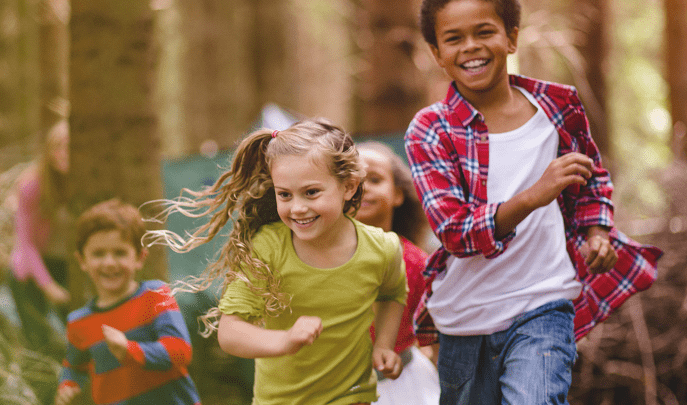“Some Of Our Residentials Are 15 Minutes Away, But To The Children It Feels Like The Countryside”

School trips can be logistically challenging, but a collaborative project in Birmingham proves working together improves outcomes for everyone, says Anna Blewett

- by Anna Blewett
- Freelance journalist
Consider the humble potato peeler. It’s a mundane symbol of domestic drudgery to most of us, but it’s become a tool of empowerment in the hands of children from Birmingham’s most deprived suburbs experiencing their first nights away from home.
‘It’s the silly little things that allow children to have control, rather than constantly being told what to do’, says Louise Edwards, veteran of many a boisterous evening peeling veg with pupils from KS1 and 2. ‘Understanding they have to be part of the team and get stuck in with domestic chores are the things children always talk about when they get back to school.’
Louise should know; for 17 years she’s co-ordinated the Pilot Partnership, a network of 11 schools formed when members of the now defunct East Education Action Zone decided to continue working together.
The original modus operandi was to share training and collaborate on inter-school projects, but a successful bid for a Paul Hamlyn Foundation Learning Away grant allowed the partnership to add residential trips to its offer.
Going out out
‘First and foremost Louise came up with three different venues we’d not been to,’ says Maggie Rose, head at Timberley Academy and a founder member of the partnership. ‘The government is pushing maths, English and exam performance, so residentials give us a chance to give children who may not be academic high flyers the chance to flourish.
“I wouldn’t want Louise’s job – trying to get that many headteachers in a room to agree – but she’s been brilliant. She comes up with great ideas and puts bids in to help with funding, meaning the kids get a really good experience.’
Louise and her small team – funded by membership fees from partnership schools and revenue raised by extending some services to non-members – haggle hard to deliver packages accessible for even the most impoverished families.
‘We seek out very cheap sites – scout camps and charity woodlands – and because we’re buying in bulk, we get good prices,’ says Louise. ‘Providers want our block booking because it’s assured work for them, so they’re willing to negotiate.’
The most recent two-day excursion for Y1 and 2 cost just £5.77 per head (plus food and transport); that buys a lot of benefits for children from one of the UK’s most deprived areas.
‘Some of our residentials are literally 15 minutes down the road from the school, but to the children it feels like the countryside,’ says Chrissie Broadhurst, senior learning mentor at Brownmead Academy. ‘Some only know city life so it’s really new to them. To leave computers behind and see them outside enjoying what’s going on is amazing.’
Located just a few streets from Timberley, Brownmead Academy joined the partnership three years ago and has been benefiting from the tried and tested set-up ever since. ‘That, to us, is really valuable,’ says Chrissie. ‘We walked into a ready-made programme that lessened the pressure of organising residentials. Everything’s planned via the curriculum, and the costings are affordable for our parents.’
Grasping the nettle
The Pilot Partnership has honed its programme of courses to three themes: cultural diversity, with a strong creative element; ‘a chance to shine’ which see pupils write and produce their own film; and, foremost, respect, which Louise sees as a critical strand running through all the courses.
‘We have historical problems in the area; very young teenage parents, health problems, drug and alcohol issues and domestic violence,’ she explains. ‘All of this stems from poor levels of respect – and self-respect – so we wanted that value at the core of the programme.’
Content is also designed to address the challenges posed by a rapid change in the former EAZ’s ethnic profile. ‘We have an active National Front and BNP, so we decided to tackle that issue at grassroots level. The final residential (for Y5 and 6) is based around film-making, but is really about having appropriate role models. So many of the children want to be footballers or pop stars; this programme is about the reality of life and different roles – people who write the scripts, who operate the camera – beyond the star. It’s an innovative way to show that nothing gets done if you don’t have a team with you.’
It’s hardly the familiar ‘zip-wire and waterproofs’ offer for older children, and that’s part of the appeal for Maggie Rose, who sends kids on partnership trips as well as organising her own residentials for other year groups.
‘I’m a rare breed of headteacher – I come from a PE background,’ she starts, ‘and if you’re committed to outdoor experiences you find solutions. We work with the Pilot Partnership because the residentials they offer are so different to what we do ourselves. I wouldn’t think of doing a trip based around children writing film scripts and creating a movie, so it’s brilliant that Louise has found ways of doing it.’
And the effect the courses have on outcomes for kids from member schools? Louise takes a long view, ‘Issues linked to poverty continue to present a significant challenge around here, but trying to instil new aspirations – different possibilities – in children, beyond what they see on a day-to-day basis, means starting young and that’s our aim. In the first couple of years of trying to establish a programme, you have to be really consistent and stay true to the mission, but our experience shows that eventually the benefits cascade.
“The community gains confidence in what you’re doing. That impact is not going to be apparent initially, but it’s about having a strong vision and staying on track with it.’
BACK IN THE CLASSROOM
Do the soft skills developed on residentials translate into tangible benefits back in the classroom?
Externally-verified evaluations conducted among KS2 students at the end of the Learning Away project found 71% reported better relations with other children in their class, 78% felt empowered to try new activities they wouldn’t have considered before their outing, and 79% said they knew their teachers better as a result of the trip.
For Chrissie Broadhurst, the impact is most obvious in pupils starting from a low base. ‘We have a child whose attendance was really shocking, about 70%,’ she recalls.
‘We spoke to her parents about the residential and put together a plan: if attendance improved we would work towards paying some of the cost for her. So she came on the residential, and she shone. Because she was out of school so much she had poor relations with her peers, but she got on with it, really enjoyed her time away and, as a result, her attendance has shot up. We had 100% attendance from her towards the end of the year.
‘It’s confidence as well. Now she wants to come in, she approaches staff to speak to us, and she’s happy.’









